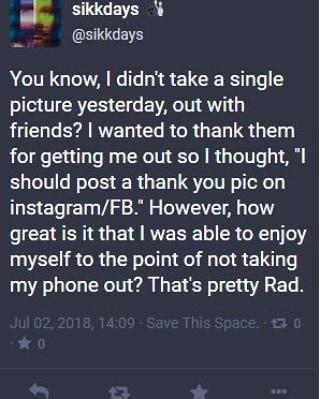
I took this picture wondering how this even happened. How did I end up with identical 8 year old laptops? Like many things in my life recently, the answer is somewhat complex and related to mental health.
First, I offered to adopt the second laptop because it was not functioning. I wanted the challenge of seeing if I could breath life back into the device. When you work at a retail store, your first job is sales not repair. So, when the original owner was told "We cannot promise that a fresh install will work, but you'll lose everything," I was somewhat alarmed. These things are not cheap, Mr. Apple Store "genius." Why not try? I wasn't part of this original conversation, so I have no idea if the "genius" offered to backup the data before the fresh install (which is completely possible on Macs with their Target Disk Mode). Yet, this is a 7+ year old device. I've added a new battery, more memory, and a solid-state drive to my personal laptop that is 6+ months older, and I am frequently frustrated by its sluggishness. Thus, I can understand why one would choose to buy a new laptop instead of fixing this one. Of course, it's a matter of cost which brings me to the more complex answer to "how did I end up with a second 8 year old laptop?"
One of my deepest wounds is about my worth. I place a tremendous amount of value on productivity, salary, and how others see me. It's impossible to love and approve of one's self when you are constantly comparing yourself to those around you. There's always someone smarter, braver, bigger, stronger, faster, etc. I can never measure up. I used to make this joke at the expense of my mother's parents, "If I was President, my grandparents would say, 'It's not a very well paying job. You can do better.'" When my mother was in a deep depression, she couldn't get out of bed. For me, it's always been unemployment. How can I ever live up to the expectations I've made for myself? Impossible.
Even now, as I write this, the self critic in me feels that I've been unemployed more in my life than employed. Thoughts that I'm a loser for typing this to the world are loud and frankly hurtful. The reality of those emotions flooding in had me step away from writing this post, briefly.
Being unemployed for long periods of time, and my childhood have created some unfortunate financial habits. As such, I jumped at the possibility of being gifted 7+ year old laptop. My mother helped me realize that we rarely invested money, or saved for vacations while I was growing up because of my dad's health. Dealing with all the complications of Myasthenia Gravis didn't leave us with a lot of money. Nor was there the security of believing that it was a possibility to take a trip to Hawaii in the following year. And so, we didn't look to the future. This infected me with the "I could walk out the door and get hit by a bus" virus. This bug makes me and others see money differently.
My self critic enjoys not being financially stable or employed because it gives him life and meaning. When I see a shiny new phone, laptop, or something else I cannot afford, it is fuel for shame. Therefore, in shame I jumped at the opportunity to get an identical laptop because I don't deserve a new one. I can't afford a new one, because I am not earning enough, because I'll never earn enough.
It's getting easier to see these damaging thought patterns in my life. However, it often happens after the fact, when I can take a step back and see what transpired. Then, my demon returns to tell me, "So much for getting better. You screwed up again." At this point, compassion is useful. A compassionate friend reading this may note that it's great that I can finally recognize the pattern. That's a first step. That same friend might also feel like giving me a hug. This is a role I can take, accepting myself as I am now and giving myself compassion. It's something I have been successful at, but it is not easy. I hope in time this will become a new pattern.
In the meantime, what am I doing with this second laptop, really? Do I donate it somewhere? Perhaps, I offer it back to its original owner, or sell it and give the money to her? There's silly projects I can do with another computer, but I'd rather have a little Raspberry Pi that consumes less energy. I realize this dilemma is one of privilege, but I'm grateful to have another chance at recognizing my self-worth issue.
Much <3







